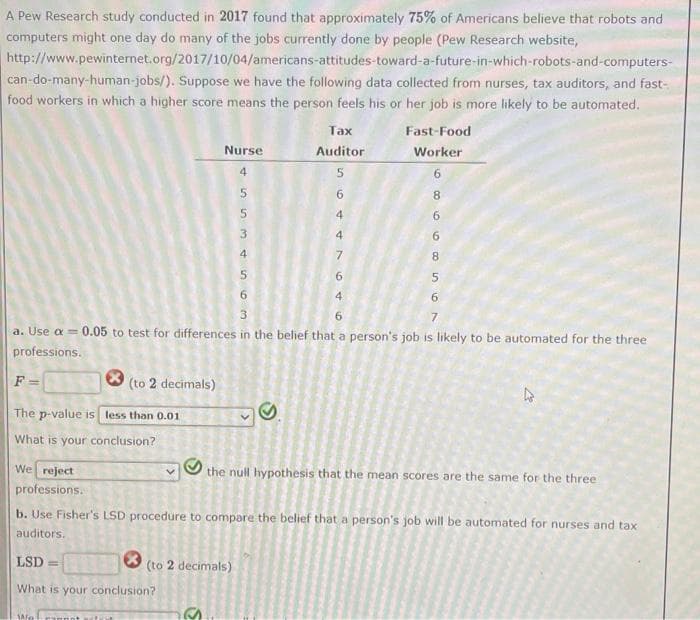A Pew Research study conducted in 2017 found that approximately 75% of Americans believe that robots and computers might one day do many of the jobs currently done by people (Pew Research website, http://www.pewinternet.org/2017/10/04/americans-attitudes-toward-a-future-in-which-robots-and-computers- can-do-many-human-jobs/). Suppose we have the following data collected from nurses, tax auditors, and fast- food workers in which a higher score means the person feels his or her job is more likely to be automated. Тах Fast-Food Nurse Auditor Worker 4. 6. 8 4. 6. 4. 6. 8. 6 6. 4 6 3. 6. a. Use a = 0.05 to test for differences in the belief that a person's job is likely to be automated for the three professions. F= (to 2 decimals) The p-value is less than 0.01 What is your conclusion? We reject the null hypothesis that the mean scores are the same for the three professions. b. Use Fisher's LSD procedure to compare the belief that a person's job will be automated for nurses and tax auditors. LSD (to 2 decimals)
A Pew Research study conducted in 2017 found that approximately 75% of Americans believe that robots and computers might one day do many of the jobs currently done by people (Pew Research website, http://www.pewinternet.org/2017/10/04/americans-attitudes-toward-a-future-in-which-robots-and-computers- can-do-many-human-jobs/). Suppose we have the following data collected from nurses, tax auditors, and fast- food workers in which a higher score means the person feels his or her job is more likely to be automated. Тах Fast-Food Nurse Auditor Worker 4. 6. 8 4. 6. 4. 6. 8. 6 6. 4 6 3. 6. a. Use a = 0.05 to test for differences in the belief that a person's job is likely to be automated for the three professions. F= (to 2 decimals) The p-value is less than 0.01 What is your conclusion? We reject the null hypothesis that the mean scores are the same for the three professions. b. Use Fisher's LSD procedure to compare the belief that a person's job will be automated for nurses and tax auditors. LSD (to 2 decimals)
Linear Algebra: A Modern Introduction
4th Edition
ISBN:9781285463247
Author:David Poole
Publisher:David Poole
Chapter7: Distance And Approximation
Section7.3: Least Squares Approximation
Problem 31EQ
Related questions
Question

Transcribed Image Text:A Pew Research study conducted in 2017 found that approximately 75% of Americans believe that robots and
computers might one day do many of the jobs currently done by people (Pew Research website,
http://www.pewinternet.org/2017/10/04/americans-attitudes-toward-a-future-in-which-robots-and-computers-
can-do-many-human-jobs/). Suppose we have the following data collected from nurses, tax auditors, and fast-
food workers in which a higher score means the person feels his or her job is more likely to be automated.
Таx
Fast-Food
Nurse
Auditor
Worker
4.
6.
8.
4.
6
4
6.
7.
8.
6.
4
6.
7
a. Use a =
0.05 to test for differences in the belief that a person's job is likely to be automated for the three
professions.
F =
(to 2 decimals)
The p-value is less than 0.01
What is your conclusion?
We reject
the null hypothesis that the mean scores are the same for the three
professions.
b. Use Fisher's LSD procedure to compare the belief that a person's job will be automated for nurses and tax
auditors.
LSD =
(to 2 decimals)
What is your conclusion?
Expert Solution
This question has been solved!
Explore an expertly crafted, step-by-step solution for a thorough understanding of key concepts.
This is a popular solution!
Trending now
This is a popular solution!
Step by step
Solved in 3 steps with 5 images

Recommended textbooks for you

Linear Algebra: A Modern Introduction
Algebra
ISBN:
9781285463247
Author:
David Poole
Publisher:
Cengage Learning

Holt Mcdougal Larson Pre-algebra: Student Edition…
Algebra
ISBN:
9780547587776
Author:
HOLT MCDOUGAL
Publisher:
HOLT MCDOUGAL


Linear Algebra: A Modern Introduction
Algebra
ISBN:
9781285463247
Author:
David Poole
Publisher:
Cengage Learning

Holt Mcdougal Larson Pre-algebra: Student Edition…
Algebra
ISBN:
9780547587776
Author:
HOLT MCDOUGAL
Publisher:
HOLT MCDOUGAL
